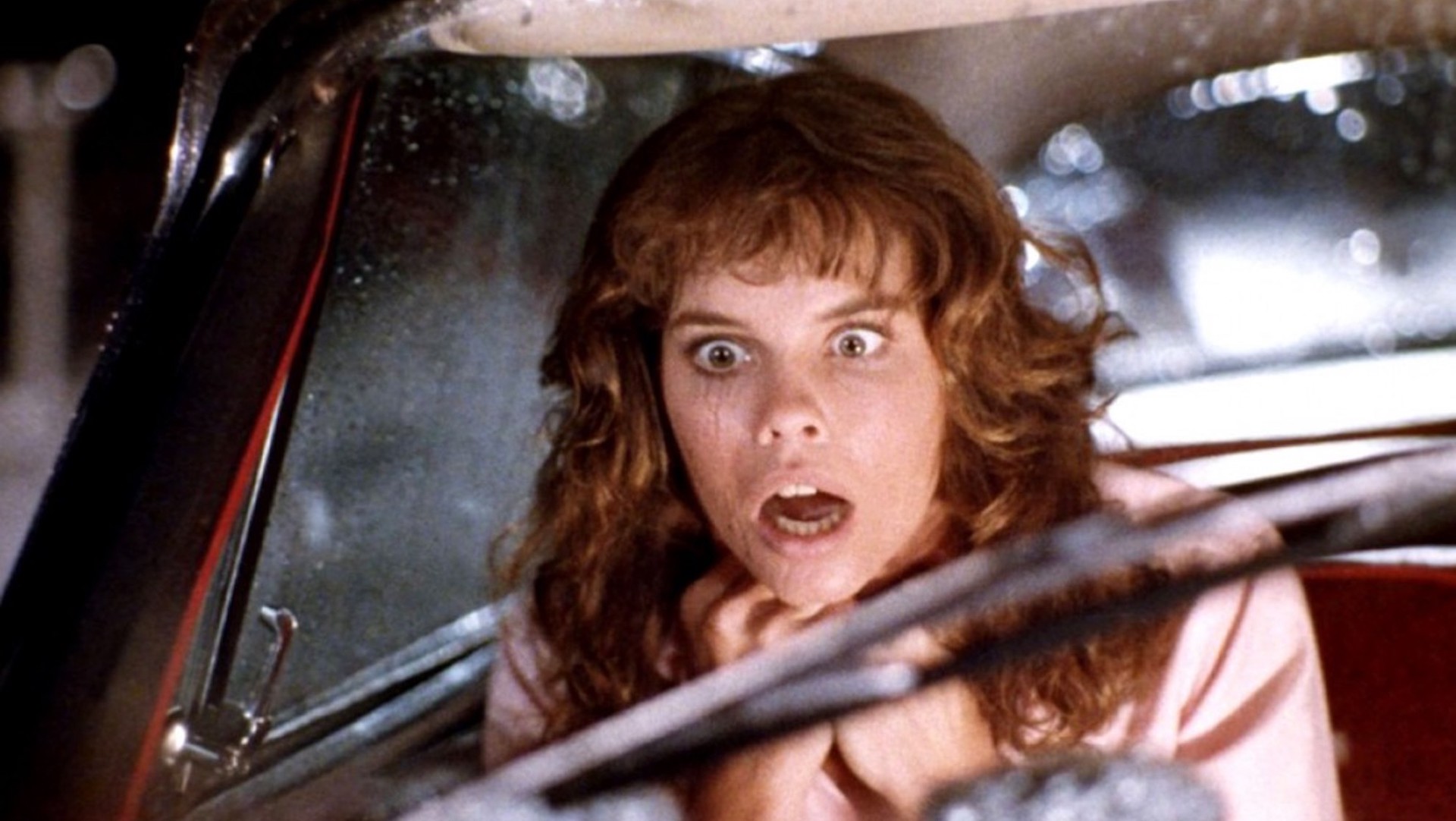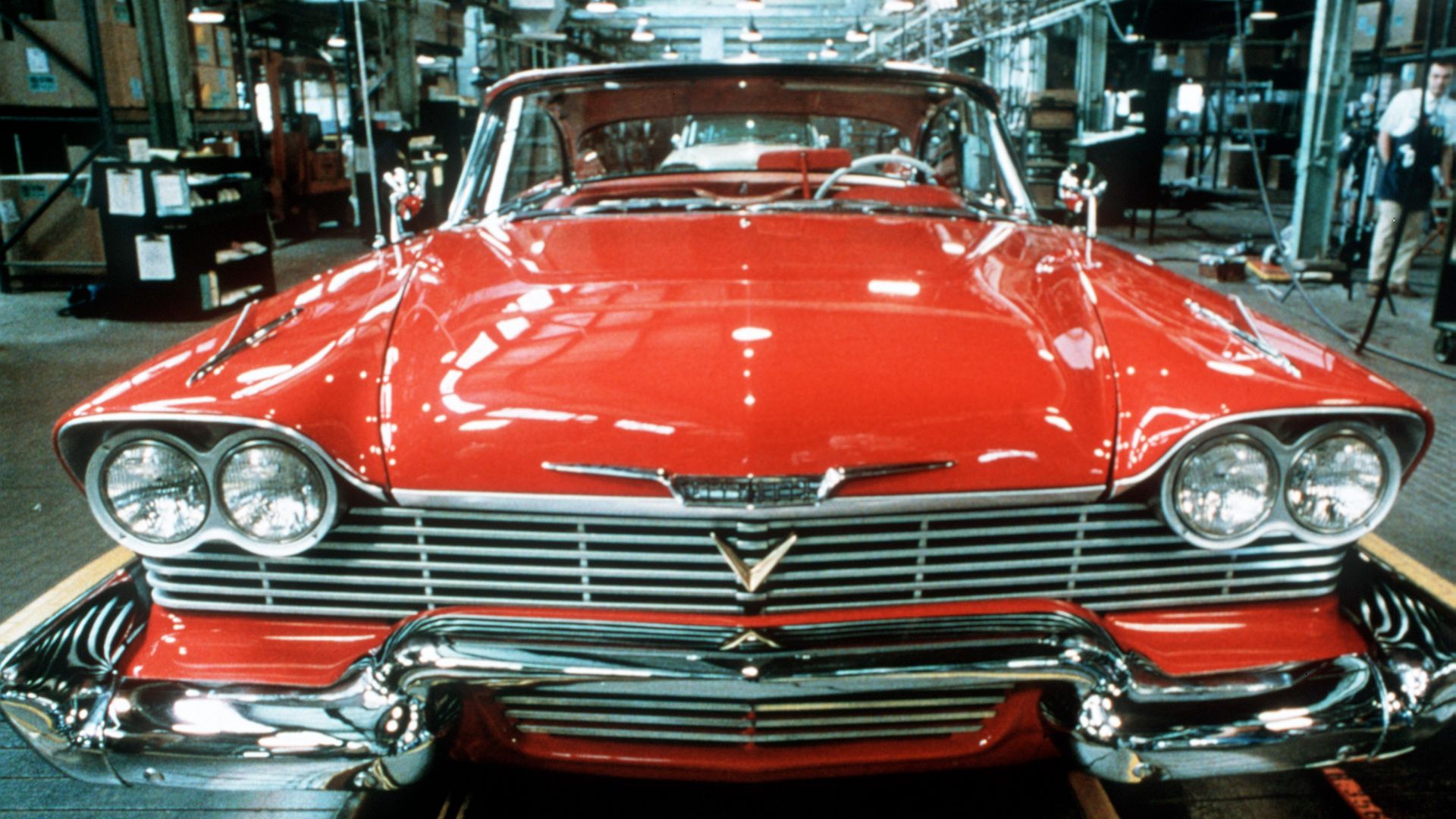John Carpenter and star Keith Gordon discuss Christine as it turns 40
Total Film hitches a ride as the cult classic celebrates its 40 anniversary

This feature first appeared in the October 2023 issue of Total Film magazine. You can purchase a hard copy here.
Given that Christine is about obsessive love, it’s ironic that John Carpenter has never been that into his 1983 film. When Total Film mentions that it has only grown in reputation over the last 40 years, to a point that many now regard it as a classic or even a genre masterpiece, he scoffs down the phone: ‘Oh come on, stop, that’s ridiculous. I know there’s some rumblings about its anniversary. My question is, “Why?”’
Carpenter’s fond of his adaptation of Stephen King’s book about a deadly car named Christine, and he sure had a blast making it. But he’s always regarded it as a gig for hire rather than a personal project like the movies he made before (Assault on Precinct 13, Halloween, The Fog, Escape from New York) and after (Prince of Darkness, They Live). That he chose to sit behind the wheel of Christine at all was not because he fell head over heels in love with her, but because he fell flat on his face: The Thing, now considered one of the great horror movies, opened to scathing reviews and worse box office, causing Universal to fire Carpenter from his next movie, Firestarter. Back then, hopping from one King adaptation to another was not such a coincidence, considering every horror director was attached to a King story. ‘I needed a job, frankly,’ recalls the 75-year-old filmmaker with a raspy chuckle. ‘The Thing was my very first studio film. I was just diving in the pool here, and all of a sudden, WHAM. And getting fired off a movie is not the most pleasant thing.’
Carpenter’s friend, producer Richard Kobritz, had received advance manuscripts of the next two King novels, Cujo and Christine. Kobritz preferred Christine and took it to Carpenter having teamed with him on the excellent TV movie Someone’s Watching Me! ‘To be very frank with you, I wasn’t in love with Christine,’ Carpenter admits. ‘Christine was essentially a haunted car movie, with Roland LeBay’s ghost in the backseat. I wasn’t sure about that.’ Screenwriter Bill Phillips excised (exorcised?) the ghost of Roland LeBay.
In the book, the malicious LeBay, a previous owner of Christine, rides shotgun to teenager Arnie Cunningham once Arnie’s restored the eponymous 1958 Plymouth Fury from a hunk of junk to a pristine ride with a paint job of fire-engine red and whitewall tyres. LeBay’s malevolent spirit infects Arnie, a bullied outsider, and our put-upon hero becomes increasingly confident as he starts dressing like a 50s greaser and dating Leigh, the hottest girl in school. Meanwhile, a series of grisly deaths befall his tormentors. In Carpenter’s movie, however, an opening sequence set in 1957, some 21 years prior to the main action, establishes that Christine is ‘born’ bad – we see her kill one factory worker and injure another before she’s even rolled off the assembly line in Detroit.
Come on, Christine!

Kobritz and Carpenter set up the movie at Columbia Pictures. The studio wanted Happy Days’ Scott Baio as Arnie and The Blue Lagoon’s Brooke Shields as Leigh, but the $9.7m budget was just low enough to ensure that Carpenter got his way on all creative decisions. As Leigh, he cast Alexandra Paul, a model with no acting experience. For Arnie, Kevin Bacon was circling the role but Keith Gordon landed the gig after Bacon opted to make Footloose. Though hardly a household name, Gordon had appeared in Jaws 2, Bob Fosse’s All That Jazz and Brian De Palma’s Home Movies and Dressed to Kill. He excels in the Jekyll and Hyde role. ‘I identified [with Arnie] like crazy,’ says Gordon on Zoom from LA. He rarely acts these days and is a director of repute having made a handful of fascinating indie movies (Mother Night, Waking the Dead, The Singing Detective) and a clutch of quality TV (Dexter, The Leftovers, Better Call Saul, Fargo). ‘Teenage years are tough for everybody,’ he sighs. ‘I don’t think anybody comes through unscathed. And I was definitely an outsider. I got a scholarship to a school that was full of really rich kids, and I wasn’t that. I wasn’t cool enough to be one of the cool kids. I wasn’t nerdy enough to be one of the nerdy kids. So I ended up alone a lot.’
Gordon also knew all about obsessive first love. In the movie, Arnie’s feelings for Leigh are potent but they’re nothing compared to his adoration for Christine. ‘What is it about that car?’ asks his best – his only – friend, Dennis (John Stockwell), as he sees his childhood pal consumed by bitterness and rage. ‘Maybe it’s just that for the first time in my life, I’ve found something that’s uglier than me,’ responds Arnie. ‘John and I talked a lot about making it a really carnal love,’ says Gordon, smiling wistfully as he recalls how Arnie is forever caressing Christine’s voluptuous curves. ‘I had the first big love of my life when I was 16. I fell head over heels for this girl, and lost my virginity to her. And then her parents read her diary and sent her away to boarding school, in Texas. It was fucking insane. It was very emotional and upsetting. So I had that to draw on.’
Sign up for the Total Film Newsletter
Bringing all the latest movie news, features, and reviews to your inbox
Carpenter, too, connected to the themes of loneliness and first love, agreeing that they helped him to invest in the film. ‘Sure, absolutely,’ he says when Total Film asks if he felt isolated growing up in Bowling Green, Kentucky. ‘I mean, I was Arnie, though I didn’t have glasses. I really felt what he felt.’ And first love? ‘Oh boy, you know it.’ He points out that male American youths of the era were captivated with hotrods and girls in equal measure, and these obsessions often converged. ‘Eisenhower put in the highway system throughout America and it was pumped on television: “See the USA in your Chevrolet.” It was like the American Dream. Get out there and drive around with your girl. Go to the drive-in. I lost my virginity at a drive-in.’
Carpenter got Christine’s engine running by populating it with first-rate character actors, most notably Harry Dean Stanton as investigating cop Rudolph Junkins, Robert Prosky as garage proprietor Will Darnell, and Roberts Blossom as George LeBay, who sells Christine to Arnie after his brother, Roland, chokes to death in her. He then added the fuel injection: a signature synth score, a slew of 50s rock-n-roll hits and a constantly prowling camera (Carpenter’s always been a superlative craftsman but Christine is his most technically impressive film). The filmmaker is far too averse to pretentious bullshit to discuss such things – ‘I used a Panaglide to keep this piece of shit moving,’ is his take on the filmmaking technique on show – but a mobile camera befits a movie about a cruising car. ‘The car was the star,’ says Carpenter, who changed many of the deaths from the book in order to maximise the cinematic possibilities of seeing Christine glide through the night, stalking her prey. And while only 5,303 models of the 1958 Plymouth Fury were made, all in Sandstone White, the production hunted down 24 models to use in the film. ‘These Plymouth Furies had to be refurbished and painted, buffed and fluffed,’ he chuckles.
Throughout the movie, Christine is beaten, banged up and even burned to a crisp, but each time she regenerates to her former state of gleaming glory. Originally the plan was to never see a restoration in process, but after shooting finished, Carpenter decided that he owed viewers the money shot. And so he fashioned the iconic scene in which Arnie strokes Christine’s broken body, walks a few paces away, then turns and murmurs, ‘Show me.’ What follows is showstopping stuff, as Christine’s headlights blast to life and her crumbled form stirs, strains and then fully reconfigures to a languorous swirl of seductive jazz. ‘Roy Arbogast did the effects,’ says Carpenter. ‘He worked with me on The Thing. He figured out a way to have Christine put herself back together again. That was a big deal for us.’ The secret? A hollowed-out car fitted with hydraulics to pull it inwards, with the scene then played in reverse. It’s sexy and sensational, and Christine, we realise, will always be there for Arnie. ‘No shitter ever came between me and Christine,’ he spits.
Let's motorvate!
Released into 1,045 theatres on 9 December 1983, Christine took $21m at the domestic box office. Decent, not great. Similarly, the reviews were lukewarm, and King himself was unimpressed. The author has always famously loathed the film version of The Shining, and he mentioned Christine in the same breath: ‘Christine and Stanley Kubrick’s take on The Shining… should have been good but… well, they just aren’t. They’re actually sort of boring.’ Since rolling into cinemas, Christine was first anointed a cult classic and then, in the last decade, a classic, period. It can even be found on the esteemed Criterion Channel, engine purring like a Cheshire cat. ‘The reviews weren’t mean but they weren’t particularly enthusiastic,’ sums up Gordon. ‘It was considered mid-level Carpenter. And then it was really on cable television that it started to develop an audience, and then on home video. It’s one of those films that’s had a second and third life. The perception of it, even by critics, has really evolved. A lot more people have written about it with some seriousness and appreciation. I think its ranking among John’s films has definitely risen into the top flight of his work.’ Carpenter, naturally, waves away the praise. ‘I’m not aware of any of that,’ he claims. ‘You gotta realise one thing about me – no one ever tells me anything. But I’m glad. I like it. I like it a lot. For reasons like the cast. I really dig them. And the car. It was fun. It’s not one of my favourites of mine, but that’s OK. It’s a good movie.’
And how do the director and his leading man feel about the Bryan Fuller remake that’s currently in production? The Hannibal creator has stated that his version will cleave closer to King’s book and offer more layers, describing it as a ‘tiramisu’ to Carpenter’s ‘cookie’. ‘I think he’s really talented, and a good person to do it,’ says Gordon. ‘I mean, I don’t have a negative feeling about people remaking something, especially 40 years later. Christine could be told in a different way and not be an insult to the original. There’s a very short list of untouchable classics that should never be remade – films where their groundbreaking-ness or idiosyncrasy is what makes them special. I wouldn’t want to see anybody’s remake of Citizen Kane, or 2001, or Raging Bull.’ Carpenter, of course, says he doesn’t know anything about it, and responds with his usual modesty. ‘Oh boy,’ he says. ‘Well, good luck to him. It will probably be better.’
For more spooky shenanigans, check out out list of the best horror movies of all time.
Jamie Graham is the Editor-at-Large of Total Film magazine. You'll likely find them around these parts reviewing the biggest films on the planet and speaking to some of the biggest stars in the business – that's just what Jamie does. Jamie has also written for outlets like SFX and the Sunday Times Culture, and appeared on podcasts exploring the wondrous worlds of occult and horror.


